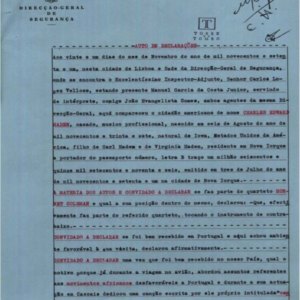
A book from Routledge’s Transnational Studies in Jazz series co-edited by Tony Whyton and Nicholas Gebhardt

Charles Edward Haden arrest report, p. 1.
Source: ANTT/PIDE/DGS, Procedure No. 690-CI (2), File No. 42.
My first contribution to Routledge’s Transnational Studies in Jazz series, both, as editor advisor, and an author has been published in the Jazz and Totalitarianism (2017), edited by Bruce Johnson. My article, titled “A Kind of ‘in-between’: Jazz and Politics in Portugal (1958-1971)”, explores the use of jazz as a form of protest and a symbol of freedom during the Portuguese right-wing colonialist Estado Novo regime.
 In 1958 Salazar’s regime of Estado Novo, in response to international pressure, eased repression and promoted ‘free elections’ to give the illusion of a free country. In this context, students at the University of Lisbon founded the University Jazz Club (Clube Universitário de Jazz). The Portuguese police closed it in 1961 after the first signs of the war of the independence in Angola. In 1971, during Caetano administration, Portugal hosted a famous international jazz festival, o Festival Internacional de Jazz de Cascais. Although state-sponsored, it became a space of political resistance for thousands. It led to the arrest of North American double bass player Charlie Haden by the Portuguese Political Police (Direcção Geral de Segurança).
In 1958 Salazar’s regime of Estado Novo, in response to international pressure, eased repression and promoted ‘free elections’ to give the illusion of a free country. In this context, students at the University of Lisbon founded the University Jazz Club (Clube Universitário de Jazz). The Portuguese police closed it in 1961 after the first signs of the war of the independence in Angola. In 1971, during Caetano administration, Portugal hosted a famous international jazz festival, o Festival Internacional de Jazz de Cascais. Although state-sponsored, it became a space of political resistance for thousands. It led to the arrest of North American double bass player Charlie Haden by the Portuguese Political Police (Direcção Geral de Segurança).
My article analyses these two significant historical jazz events.
